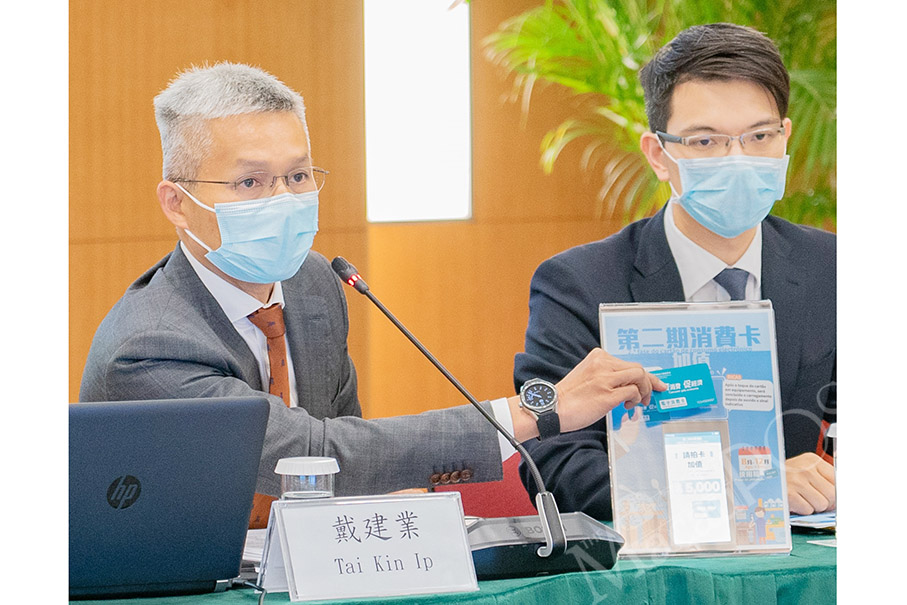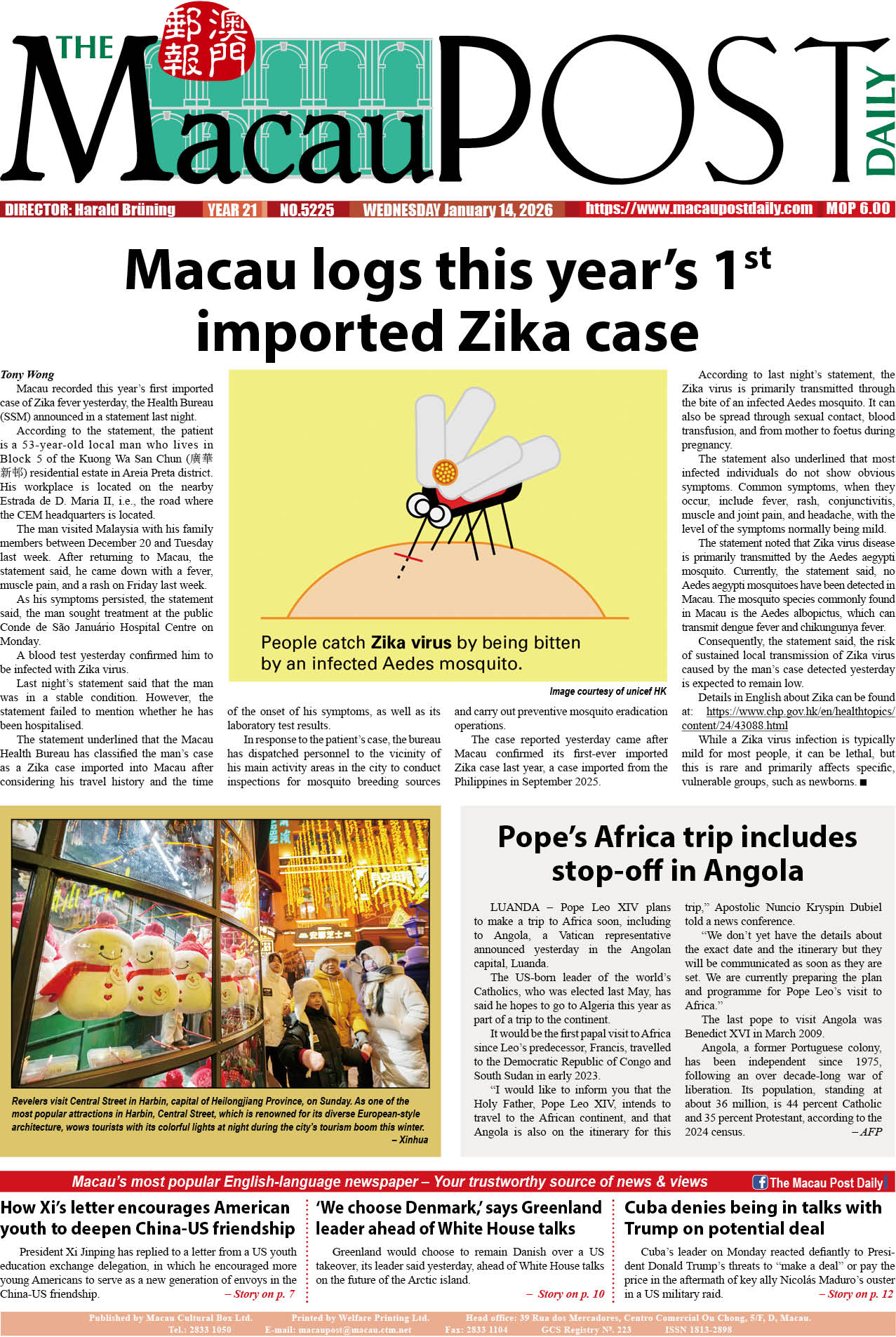Residents can start to top up their consumption smartcards for the second phase of the government’s subsidy scheme to boost locals’ spending from Monday at various service points across the city, the government announced yesterday.
The top-up amounts to 5,000 patacas.
Residents can top up their smartcards at the service points, including public administration premises, community association venues and bank branches, without the need to present their ID cards. They merely need to hold their smartcards over a reader.
Residents will have to spend the 5,000 patacas between August 1 and December 31. As in the current first phase (3,000 patacas), they can only spend up to 300 patacas per day during the second phase.
Both permanent and non-permanent residents are entitled to the consumption subsidy scheme. Macau’s around 190,000 non-resident workers are excluded from the scheme.
Those who did not pick up their smartcards for spending during the current first phase can, however, obtain the second-phase subsidy of 5,000 patacas, in which case they can pick up their cards at one of several card collection points by presenting their ID cards.
The government announced details of the second phase of its consumption subsidy scheme during a press conference at Government Headquarters yesterday.
1st phase ends next Friday
The first phase of the consumption subsidy scheme, a 3,000-pataca smartcard, started on May 1 and ends next Friday. The government has said that the second phase is needed to continue boosting local consumption and stabilising the job market amid the ongoing adverse impact of the COVID-19 pandemic on Macau’s economy.
Before the first phase started in May, residents needed to register online to pick up their 3,000-pataca consumption smartcards – known in Cantonese as “siufai kat”.
Those who never registered for a consumption smartcard or failed to pick up their card in the first phase can collect their smartcard for the second phase without having to register in advance, but they have to show their ID card.
If a resident does not spend all the 3,000 patacas in the first phase of the scheme, the remainder will not be carried forward into the second phase but will revert to the public coffers.
During yesterday’s press conference, Economic Services Bureau (DSE) Director Tai Kin Ip said that residents can obtain the second-phase subsidy of 5,000 patacas between Monday and December 14 – for both topping up their existing card (those who had previously picked it up) and collecting a new card (those who did not pick it up previously).
According to Tai, only those who have already spent the 3,000 patacas in their smartcards can start to top it up from Monday. Those who still have money left in their cards before August 1 can only top it up from August 1 when the money remaining from the first phase will revert to the government.
Tai underlined that those who top up their smartcard or collect a new card before August 1 can only start to use the new 5,000 patacas from August 1. Tai said the measure allowing residents to have the 5,000-pataca subsidy credited to their consumption smartcards between Monday and next Friday aimed to divert the flow of people so that not all residents start to top-up the cards from August 1.
As in the first phase, the smartcards cannot be used for paying public utility bills such as water and electricity or telecom services, and they cannot be used to buy ferry and air tickets. Neither can residents use the card to pay for outbound tourism services and health services. In addition, the card cannot be used for spending in casinos, pawnshops, banks, insurance companies and other financial institutions.
The smartcards are operated by MacauPass. Residents can spend the subsidy credited to their contactless stored-value card by placing it over MacauPass terminals installed at local shops or other businesses for goods and services.
Transferable but not for cash
The consumption subsidy cannot be converted into cash, and it can only be used to buy goods and services. The cards are transferable.
Tai said that those who already have a consumption smartcard can hold it over a reader to top it up at 190 top-up points across the city, comprising 29 venues on government premises, 31 community association venues, 127 bank branches and three MacauPass service points. They will not have to register or make an appointment in advance and will not have to present their ID cards at the top-up points.
Tai said that those who did not pick up their 3,000-pataca consumption smartcard previously or have lost their 3,000-pataca smartcard can pick up a new 5,000-patacas smartcard at one of six card collection points where they will only have to present their ID cards without the need to register or make an appointment in advance.
According to Tai, those who have lost their 3,000-pataca smartcard will have to report the loss to the police first before they can pick up the new 5,000-patacas smartcard.
For the consumption subsidy scheme’s first phase, a minor’s smartcard needed to be picked up by one of their parents or legal guardian. Tai said that for the second phase, the 5,000-pataca smartcard of a minor can also be picked up by his or her grandparents, adult brother or sister, uncle or aunt, in addition to his or her parents or legal guardians.
As in the first phase, residents may also download an authorisation from the Economic Services Bureau website to designate another person to pick up the smartcard for them. That person needs to present the smartcard holder’s ID card and his or her own ID card together with the authorisation form signed by the smartcard holder when collecting the consumption smartcard.
According to Tai, the government will penalise businesses that engage in price gouging or provide misleading price information to consumers for the scheme’s second phase. Tai said that depending on the severity of the offence, the government may disallow all or some outlets of the business concerned to benefit from the scheme for a certain period of time.
According to Tai, 624,000 residents picked up their first-phase 3,000-pataca smartcards before the July 17 deadline, or 95 percent of the 658,000 who had registered. Some 732,000 residents were eligible for the subsidy in the first phase. So far some 1.82 billion patacas have been spent by holders of the consumption smartcards in the first phase, Tai said.
Tai said that based on the government’s population growth estimate during the next few months, 737,000 Macau residents are expected to be eligible for the second-phase 5,000-pataca smartcard. Tai said that therefore the government expected to spend up to 3.68 billion patacas on the scheme’s second phase.
Tai also said that as the government’s ongoing Macau tour scheme is not an outbound tourism service, residents can pay for the local tours with their consumption smartcards.

Economic Services Bureau (DSE) Director Tai Kin Ip (left) shows reporters how to top up their consumption smartcard by placing it over a reader during yesterday’s press conference at Government Headquarters about the scheme’s second phase, as Pong Kai Fu, who heads the bureau’s Research Department, looks on. Photo: GCS





